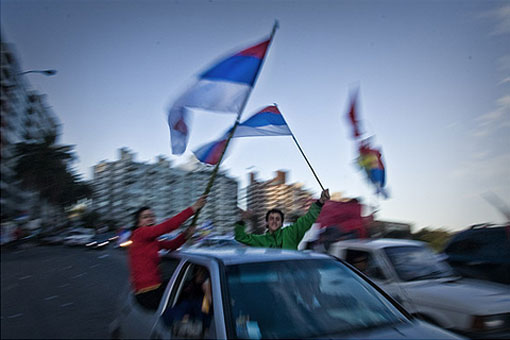October 30, 2009
The party in power loses votes. This phrase sums up one of the most consistent rules in Uruguayan electoral history for the last 60 years. As was made perfectly clear during the first round of presidential voting on October 29, the government of Tabaré Vázquez is no exception to this rule.
But José Mujica, the former leftist guerrilla leader and current presidential candidate from Vázquez’ Broad Front party (Frente Amplio), is still the clear favorite to win the runoff election on November 29. To win the presidency, Mujica must obtain more votes than former President Luis Alberto Lacalle, the candidate from the National Party (PN). For the political powerhouse of the Frente Amplio, defeating the National Party leader will not be very difficult.
The Frente Amplio, formed only two years prior to the 1973 coup, has, until recently, seen a consistent growth in party affiliation (from 18 percent in 1971 to 50 percent in 2004). However, from 2004 to 2009 the party contracted by 2 percent. The party likely lost support among middle-class voters due to a variety of factors: changes that the current government made to the tax system; new guidelines governing health care financing and widespread uneasiness sparked by a feeling of public insecurity.
However, the slight drop in the Frente Amplio’s support is not simply a result of the public’s discontent with some of the policies of the Vázquez administration. The Frente Amplio registered less support than it did five years ago for two other reasons. The party lost nearly 10,000 votes from the radical left, and Mujica became the presidential candidate with the support of the Communist Party, promising to move a second Frente Amplio government further left than the current one. This undoubtedly led to a loss of confidence among moderate voters.
The Frente Amplio’s slight weakening presents an inescapable paradox. The economic performance of Vázquez´ presidency has been unquestionably positive, with
But it appears that the ruling party’s drop in support has come to a halt. The Frente Amplio remains the most widely supported party, followed by the country’s two oldest parties—the National Party, which received 30 percent of votes in the first round, and the Colorado Party (17 percent). Even if all those who supported the Colorado Party candidate had cast their ballots for Luis Alberto Lacalle, he would still not have as much support as José Mujica did on October 29. Election results for the General Assembly were not available at press time, but the Frente Amplio is likely to have a majority in both chambers. This means that although interesting ideas might arise in the lead-up to the next round of voting, the end results will not differ from the first round. José Mujica should win the presidency in this next month.
Despite Mujica´s guerrilla past and his campaign’s alliance with
Mujica has assured journalists and the business community that he will respect capitalism, protect foreign investment and maintain the status quo. A few days prior to the election he also proposed a political pact with the leading opposition parties that would ensure their role the policymaking process.
Although Mujica wanted to change the world 40 years ago, he is now focused on smaller, incremental changes that will have long-run effects. Winning the election will not be hard. What will be hard is fulfilling the expectations of his campaign and seeking consensus between the social democratic vision and that of the Communist Party. Either way, it will be nearly impossible for him to surpass the performance of President Vázquez.
Read the original Spanish-language version of this article.
Read some of the author’s recent quotes about the Uruguayan elections:
The New York Times: “Ex-Guerrilla Faces Close Run-Off In Uruguay Election,” October 26, 2009.
BBC News: “Uruguay Election Offers Sharp Contrast,” October 24, 2009.
The Guardian, UK: “Former guerrilla José Mujica favourite in Uruguay election,” October 25, 2009.
BBC Mundo: “Uruguay se prepara para la segunda,” October 26, 2009.




